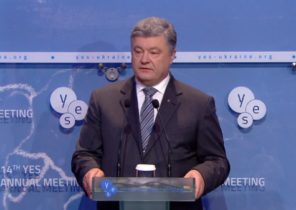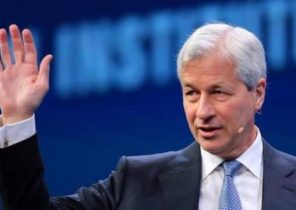
Think about two major trends in today’s world. The first is the growing ambition and the increasing activity of the two great revisionist powers, as Russia and China. The second trend is the reduction of self-confidence, the reduction of opportunities and the weakening of the will of the democratic world, especially the US, which cannot retain a dominant position in the international system, owned by them since 1945. These two converging trend, and in these circumstances, the lack of will and ability of the US and its allies to support the existing world order is faced with the increasing desire and ability of the revisionist powers to change this order. Therefore, we will reach a time when the existing order will collapse and the world will plunge into violent anarchy that has happened three times in the last two centuries. The costs of such chaos, by number of victims and the lost wealth, lost freedoms and aspirations will be mind-blowing.
Americans tend to take for granted the stability of the international order, although there are complaints about the burden on the United States, supporting and maintaining this stability. But history shows that the world order is able to collapse, and that it happens quickly, unexpectedly and violently. The end of the 18th century was the apogee of European Enlightenment, but the continent suddenly fell into the abyss of the Napoleonic wars. In the first decade of the 20th century, the brightest minds of our world have predicted the end of the era of conflict between the great powers since the revolution in communications and transportation have linked economies and peoples together. But four years later, began the most destructive war in history. To replace conventional calm of the 1920-ies came the crises of the 1930s, and then a new world war. We, as always, don’t know exactly where we are today in this classic scenario, and how close to the intersection of the trend line. How long do we have before the global crisis: three years or 15 years? Unknown. But there is no doubt that we have already embarked on this path.
It is still too early to say what impact the presidency of Donald trump will have on these trends. But the first signs indicate that the new administration is more likely to accelerate our slide into crisis, rather than slow down or deploy reverse these trends. Further concessions to Russia embolden Vladimir Putin and tough talk with China may cause Beijing wants to test the resolve of the new administration by military means. It’s unclear whether President to such a confrontation. It seems that at the moment he is not particularly thinking about the possible consequences of their utterances and actions.
China and Russia is a classic example of revisionist powers. Although both countries better today than it has ever been protected from foreign powers (Russia from its traditional enemies in the West, and China from its traditional enemy to the East), they are not satisfied with the current balance of power in the world. Both want to restore the dominant influence which they once enjoyed in their regions. For China, this means the dominance of East Asia over such countries as Japan and South Korea, which he wants to ensure that they obey the will of Beijing and acted in accordance with its strategic, economic and political preferences. This also implies the termination of American influence in the Eastern Pacific ocean and Hawaiian Islands. For Russia, this means hegemony in Central and Eastern Europe and Central Asia, which Moscow has long been considered an integral part either of its Empire or its influence. Beijing and Moscow seek to change the unfair, in their opinion, distribution of power, influence and respect in the post-war world order, which dominated the US. As autocracies, China and Russia feel threatened by prevailing in the international system of democratic forces and the democratic countries on their borders. Both see the United States the main obstacle to their ambitions, and so tend to weaken America led the international security system, which prevents them to achieve their goals and take their rightful (as they say) in the world.
All was well until the end
Until recently, Russia and China are faced with significant, almost insurmountable obstacles to achieve their goals. The main obstacle was the power and internal stability of the international order and its main protector and sponsor. A system of political and military alliances under US leadership, especially in two important regions of Europe and East Asia, to counter China and Russia with the “position of power”, as once said by Dean Acheson (Dean Acheson), (former United States Secretary of State — approx. TRANS.). So they were forced to realize their ambitions very carefully, and after the end of the cold war they had to abandon serious attempts to undermine the international system.
This system restrain their ambitions both in positive and in negative terms. In the era of American supremacy, China and Russia were participants of the open international economic system created and backed by USA. And mostly they were receiving benefits from such system. While this system functioned, they were more benefited from participating in it, than from combat and trying to destroy it. However, the political and strategic aspects of this order caused them damage. The strengthening and revitalization of democratic government for 20 years after the collapse of Soviet communism created a constant threat to rulers from Beijing and Moscow, making it difficult for them to maintain control. And after the end of the cold war, they began to consider the threat to its existence any success of democratic institutions, and particularly the geographic occurrence of liberal democracy near their borders. And not without reason. The authoritarian state from the time of Clemens von Metternich was always afraid of the pernicious influence of liberalism. The very existence of democracies close their borders, loose and uncontrolled the flow of information around the world, a dangerous connection between free-market capitalism and political freedom — all this is a threat to the rulers who want to keep control of the wayward forces in their own countries. Because of the constant threats to the legitimacy of their power, which created the U.S.-backed democratic order, these countries naturally were hostile against such order to the United States. But until recently, due to the clear superiority of the domestic and international forces they could not oppose this order directly. Chinese leaders were forced to think about what will happen to their legitimacy within the country in case of an unsuccessful confrontation with the United States. Even Putin was to only open doors, as it was in Syria, where the United States is very passively reacted to his probing. But even when faced with insignificant opposition from the US and Europe, as in the case of Ukraine, he behaved more cautiously and prudently.
The most important deterrent to Chinese and Russian ambitions, is a military and economic power of the US and its allies in Europe and Asia. China, though constantly increasing, but he has to think about the consequences of an open confrontation with the United military-economic might of the world superpowers and some very impressive regional powers, or alliances bound by common strategic interests. Among them Japan, India, South Korea and smaller, but still strong States like Vietnam and Australia. Russia is against the United States and its NATO allies. When these alliances under the leadership of the United States, they represent an insurmountable threat to the revisionist powers, which few are willing to come to the aid of allies. Even if the Chinese in the conflict will prevail at the initial stage, say, to subdue by military force, Taiwan or achieving success in naval battles in the South China and East China sea, over time they will have to reckon with a combined industrial and production potential, the richest and most advanced in technology, but also with the fact that they would deprive him of access to foreign markets, which depends very much on the Chinese economy. A weaker Russia, with its declining population and commodity-dependent economies will face even more serious problems.
Strong international position of the United States and its allies for decades was engaged in revisionist powers hunt to throw them a serious challenge. While the United States was considered a reliable ally of the Chinese and Russian leaders there were serious fears that their aggressive actions will meet resistance, because of which their regimes fall. The political scientist William Walford (William Wohlforth) once called this situation the inherent stability of a unipolar world: dissatisfied regional powers seek to challenge the status quo, and they alarmed the neighbors appeal to distant American superpower with a request to restrain these ambitions. And that system was in place. The United States intervened, and Russia and China often stepped back. Or they were forestalled before they started.
Faced with these obstacles, these revisionist great power could only rely on the weakening of a world order from the inside and its gradual undermining by means of departing the United States from allies or due to excitation of the doubt in the loyalty of America to its allies. They believed that in this case, allies and partners United States abandon the strategic protection of a liberal order and try to negotiate with those who challenged him.
Thus, the current system is based not only on American power, but also on the coherence and unity of the entire democratic world. The United States has to play the role of the main guarantor of this order, especially in the military and strategic sphere. But the ideological and economic core of this order — and this is the democracy of Europe, East Asia and Pacific region also needs to be strong and confident.
In recent years, the Foundation is shifting. The democratic order has weakened and cracked at its very Foundation. The difficult economic situation, the resurgence of nationalism and tribalism, weak and insecure political leadership, unresponsive political parties and a new era of communication, which does not weaken, but strengthens tribalism — all this together gave rise to a crisis of confidence not only to democracy, but, if I may say so, to the project of liberal education. This project has exalted universal principles of individual rights and universal values over ethnic, racial, religious, ethnic and tribal differences. He was converted to growing economic interdependence, which was to create common interests that know no borders, and international institutions, smoothing disagreements and promote cooperation between countries. But instead, for the past ten years, we see how in the world is enhanced by nationalism and tribalism, as in all societies there is a growing rejection of “the other”, as waning confidence in the government, faith in the capitalist system and democracy. We see things the opposite “end of history” by Francis Fukuyama. History comes back and takes revenge, and along with it make themselves felt most grim side of the human soul, such as reflect the desire of some men to get a strong leader who could firmly direct them in times of universal confusion and embarrassment.
The middle ages, version 2.0
Probably, the crisis of the enlightenment project was inevitable. This recurring phenomenon caused by the flaws that are inherent in capitalism and democracy. The economic crisis and increased nationalism in the 1930-ies has led many to doubt that democracy and capitalism are better alternatives such as fascism and communism. It is no coincidence that the crisis of confidence in liberalism was accompanied by the simultaneous collapse of the strategic order. At that time there was a question about whether America as a foreign power intervening to rescue or rebuild the order, which could not or did not want to support Britain and France. Now the question arose of whether I wanted the United States to continue to support the order, which they created, and which depends entirely on American power. And second: are the Americans to take the risk and do they understand at all this risk, when the existing order could collapse, creating chaos and conflict.
For quite some time, there are doubts about this willingness, and they appeared long before the election trump, and even Barack Obama. After the end of the cold war, Americans increasingly began to ask the question of why they are such an unusual and great responsibility for the preservation of the world order, although this is not always consistent with their interests, while the United States all the time, make the sacrifices, and the rest just enjoy the fruits of such a system. Few remember the reasons for which the United States assumed the exclusive role after two catastrophic world wars of the 20th century. The Millennium generation, born after the end of the cold war, hardly aware of the significance of political, economic and military structures established after the Second world war. They are also unlikely to be able to draw something useful in school and College textbooks, which seems obsessed with denouncing the vices and madness of American “imperialism.” The crises of the first half of the 20th century and their resolution in 1945 completely forgotten. As a consequence, American society is not willing to put up with the difficulties and costs associated with the global role of the United States. The old unsuccessful and expensive war in Korea in 1950 and Vietnam in the 1960-ies and 1970-ies, and previous economic troubles related with energy crisis and suffocating the “stagflation” of the mid-and late 1970-ies, has not set up Americans against US involvement in global Affairs. But a disastrous war in Iraq and Afghanistan and the financial crisis of 2008 has done its job.
Obama was ambivalent about such a global involvement of the United States, but at the heart of its strategy was the weakening of the influence. He criticized and rejected the old American strategy, heightening the national spirit in favor of reducing the role of America in global Affairs and limitations of the interests of the United States. In response to the failures of the Bush administration in Iraq and Afghanistan, Obama did not restore American power and influence — he is even more weakened. Although his administration’s promised “rebalancing” of U.S. foreign policy focusing on the Asia-Pacific region, in practice, this meant a reduction of international obligations of America and the concessions of the revisionist powers to the detriment of the security of the allies.
The administration’s attempt to “reset” relations with Russia struck the first blow to the reputation of America as a reliable ally. Rebooting started shortly after the Russian invasion of Georgia, and it was like a reward Russia for its aggression. Rebooting also carried out at the expense of American allies from Central Europe, as programs of military cooperation with Poland and the Czech Republic were curtailed for the sake of appeasement of the Kremlin. Moreover, attempts to make concessions to Russia were made just at the moment when Russia tightened its policy towards the West, and Putin pursued a policy of repression against its own people. Rebooting did not help to improve Russia’s behavior. On the contrary, it has emboldened Putin and urged him to tougher action. Inadequate reaction of the West to the Russian invasion of Ukraine and seizure of Crimea in 2014 was better than the sluggish response of the Bush administration on the invasion of Georgia (at least, after the invasion of Russia to Ukraine, the U.S. and Europe had imposed sanctions against it); nevertheless, it testifies to the unwillingness of the us administration to confront Russia in its declared sphere of their interests. In fact, Obama publicly acknowledged the privileged position of Russia in Ukraine, while the US and Europe tried to defend the sovereignty of this country. In Syria his administration for its passivity practically invited Russia to intervene and it does not interfere. This reinforced the impression that America went on the retreat throughout the middle East (originally, the impression has arisen due to the completely unnecessary and short-sighted withdrawal of all American troops from Iraq). The subsequent actions of Russia, triggering the influx of Syrian refugees in Europe, also did not cause any reaction on the part of America, despite the obvious damage that these migration flows have caused the European democratic institutions. The Obama administration gave the signal that all is not an American problem.
In East Asia, the Obama administration has weakened commendable efforts to promote an enduring American interests and influence. The so-called “pivot to Asia” was mainly rhetorical. Reductions in defense spending have prevented the United States significantly to increase their much-needed military presence in the region, and the administration, through inaction, has brought the situation to the point that the TRANS-Pacific partnership, a critical economic component of cooperation, has quietly died in Congress, the victim of a counter of his own party. The pivot to Asia has suffered from the common belief of the world that America is retreating and weakening. This belief was corroborated by the statements of the President, and the policy of the administration, especially in the middle East. Premature, unnecessary and costly in strategic terms, the U.S. withdrawal from Iraq, followed by a compromise agreement with Iran on its nuclear program, then failure to confirm the threat of force against Syrian President, took note of the whole world. Although the Obama administration insisted that the us strategy should be tied to Asia, U.S. allies have begun to doubt the reliability and durability of the obligations of the Washington, faced with the challenges from China. The Obama administration was mistaken in thinking that it will be able to retreat around the world, simultaneously assuring allies that the United States is still a reliable partner.
Nature hates a vacuum
Meanwhile, two of the great revisionist powers have gained new incentives to revise the status quo. In recent years, Russia and China increasingly challenge the current world order, as argued in the opinion that the US does not have the willpower and capabilities to save it. The psychological and political effect of the war in Afghanistan and Iraq made in the United States, weakening support for the global role of America in the world, gave the revisionists a new opportunity.
Among liberal democracies there is a myth that revisionist powers can be appeased, yielded to their demands. According to this logic, the us should retreat to reduce tensions and to weaken the rivalry. Unfortunately, often it happens the opposite. The more secure are revisionist powers, the more ambitious are their attempts to change the existing system in their favor, as resistance to change apparently weakened. Look at China and Russia over the last two centuries they have never been as protected from external attack as it is today. However, this does not satisfy them, and they have become more aggressive, seeking additional benefits in conditions when the United States do not have such a resistance as before.
These two great powers differ mainly by the methods of their work. China up to the present time behaves more cautiously, prudently, and patiently, seeking to influence primarily due to the increasing economic weight. And its growing military power, he uses mostly as a tool of deterrence and intimidation in the region. He has not yet resorted to the open use of force, although its actions in the South China sea are military in nature and have a strategic purpose. And although Beijing while is afraid to use military force, it would be a mistake to believe that he will show the same restraint in the future (even the near). The great revisionist powers with growing military capabilities invariably employ this potential, when we come to the conclusion that the potential gain outweighs the risks and costs. If the Chinese believe that America’s commitment to its allies and its position in the region weakened, or that she doesn’t want to fulfill its obligations, they will have to be very strong temptation to use force to achieve their goals. The trend lines converge, and at their intersection may be a crisis.
Russia is behaving much more aggressively. It carried out the invasion of neighboring Georgia in 2008 and Ukraine in 2014. In both cases, it took these countries have significant chunks of their sovereign territory. Given how strongly and powerfully, the United States and its allies would react to such actions during the cold war, their current passivity was a very clear signal to the Kremlin and other countries. After these incursions, Moscow has sent significant forces to Syria. Its dominance in the European energy markets it uses as a weapon. Moscow is waging a cyber war against neighboring States, as well as large-scale information war on a global scale.
Recently the Russian government uses the weapon which is missing in the Chinese Arsenal (or that Beijing prefers not to use). It directly intervenes in the electoral processes in the West, to affect the results and to discredit the democratic system. Russia is financing right-wing populist parties of Europe, including France, through its media support preferred candidates and advocates attacks on others; hacking into private e-mail in order to embarrass those against whom it operates. Last year Russia for the first time used this powerful weapon against the US, actively intervening in the American electoral process.
By any measure, Russia is weaker than China but yet she manages to achieve great success in efforts to split and weaken the West. Russia’s intervention in the democratic political systems of the West, information warfare, its role in increased flow of refugees from Syria to Europe — all this contributes to a weakening of confidence of Europeans to its political structure and authoritative political parties. Military intervention in Syria, held on the background of American passivity, reinforced doubts about the durability of the American presence in the region. Beijing until recently, their actions only even stronger tied to the United States for American allies, who fear the strengthening of Chinese influence. But this situation can change very quickly, especially if the United States will continue to follow the chosen path. There are first indications that regional powers are already building new settlements. East Asian countries consider regional trade agreements that do not feature the participation of the United States; the Philippines has actively courted China; some countries of Eastern and Central Europe closer to Russia both in ideological and strategic terms. Soon it may be a situation when both the revisionist powers will begin to act aggressively, including with the use of military means. This will create the most serious problems for American and global security, and in two regions.
Interchangeable nation
Just in this difficult period, Americans demonstrate their unwillingness to defend a world order that they created after the Second world war. Donald trump is not the only major political figure who during the last election season, urged to narrow the definition of American interests, and to ease the burden of U.S. global leadership. President Obama and Bernie Sanders have made their own versions of the “America first”. The candidate is often speaking about the loss of America’s role as the “indispensable nation,” and even Hillary Clinton felt it necessary to abandon their previous support of the TRANS-Pacific partnership. At least, there should be no doubt that American society is willing to continue to support international alliances, to deprive of the revisionist powers they coveted spheres of influence and regional hegemony, and to defend the rules of democracy and free markets in the international system.
That narrowed the definition of American interests occurs at a time of rising rivalry between the great powers that can speed up a return to the instability and clashes, characteristic of past epochs. The precariousness of the foundations of democratic peace and the refusal of the US global responsibilities has led to increased aggressive revisionism in the camp of the dissatisfied powers. And this, in turn, further weakens the confidence of the democratic world and its willingness to resist. History teaches that to break out of this vicious circle is very difficult, if the United States will not strongly change its current course.
Perhaps they are already late with this change of course. The most important and ultimately fatal decisions of a democratic country is not accepted in 1930, and 1920-ies. Disillusioned after the First world war, the Americans refused to play a strategic role in maintaining peace in Europe and Asia, although America was the only country to have sufficient power to take on this responsibility. USA is gone, and it weakened the will of Britain and France. And Germany in Europe and Japan in Asia have new incentives to implement more aggressive actions to achieve regional domination. The majority of Americans were convinced that events in Europe and Asia can not affect their safety. And only the Second world war convinced them of the fallacy of this view. “Return to normal” of the 1920s at the time it seemed safe and harmless; however, selfish in its core policy of the strongest world powers in the next decade have created conditions for disasters of the 1930s. at the beginning of the crisis it was too late, and humanity had a high price to pay for global conflict.
At such times, always appears the seductive belief that geopolitical rivalry can be addressed through cooperation and concessions. There is nothing new in the idea recently suggested of Northern Ferguson (Niall Ferguson), who said that the US, Russia and China could jointly rule the world. Such proposals for co sounded in all ages, when one or more dominant in the international system powers tried to counter the attacks of dissatisfied revisionist States. These ideas are very rarely gave a positive result. To appease the great revisionist powers, without the complete surrender is very difficult. The sphere of influence of such powers are never quite enough to satisfy their sense of pride or the ever-increasing need for security. In fact, the expansion weakens the security and generates a sense of insecurity have scared the neighbors, forcing them to unite against the growing power. The surfeit of power, which Bismarck said, is extremely rare. His successor, the German leaders were not satisfied even then, when Germany became the strongest power in Europe. In an effort to strengthen their country, the Germans created a coalition, which the European fear of “encirclement” has become a self-fulfilling prophecy.
Give them an inch, they take a mile
This is a common feature of increasing powers by their actions they give rise to the same vulnerability, which supposedly want to eliminate. They have a claim to an existing order (Germany and Japan considered themselves deprived), but to meet them while maintaining this order is impossible. Nominal concessions insufficient, however, to defend the existing order of the country can only go to such nominal concessions, if they are not compelled by superior force. Dissatisfied and consider themselves deprived of Japan were not satisfied with capturing in 1931 Manchuria. Offended, the victim of Versailles, Germany was not satisfied, returning under the wing of the Germans from the Sudetenland. These countries demanded much more, but they could not persuade the democratic state to give them what they want, not starting a war.
If given the revisionist powers spheres of influence, it will not lead to peace, but only provoke them to an inevitable conflict. Historical Russian sphere of influence does not end with Ukraine. It extends to the Baltic States covers the Balkans and comes to the heart of Central Europe. And in the traditional Russian sphere of influence countries do not have any autonomy, or even sovereignty. Poland was not independent when the Russian Empire nor in the Soviet Union. If China will receive the coveted sphere of influence in East Asia, he will be able to close the region to US, not only in military but also in political and economic terms.
Of course, China will inevitably be a huge influence in the region, like Russia in your. The United States can not and should not prevent the emergence of China as a powerful economic power. They also don’t have to want the collapse of Russia. America should welcome some competition. The great powers compete in different areas: economic, ideological, political and military. Competition in most fields is necessary and even helpful. Within the liberal order, China can compete with USA in the field of Economics. Russia can succeed in the international economic system, which defend democracy, even not being a democratic country.
But the military and strategic rivalry is another matter. Security lies at the heart of everything. After the Second world war, and today, America is the only country which has the unique geographical advantage to global security and stability. Without the US in Europe and Asia, there can be no sustainable equilibrium of forces. And although we can talk about “soft power” or “smart power”, these instruments have always had only limited value in the face of brute military force. Despite irresponsible statements about the decline of America in the military sphere it has the most obvious and undeniable advantages. And even in the rear of the other great powers, along with strong allies ability to deter security threats. But if the United States does not want to maintain a balance in remote regions of the world, the whole system will split at the seams under pressure from the unbridled military competition with regional powers. Therefore, the United States must carry military spending commensurate with its global responsibilities and roles.
If the US would agree to a return to spheres of influence, it is in any case not defuse the international situation. Just world back into a state in which it was in the late 19th century, when competing among themselves, the great powers fought over intersecting and overlapping each other’s sphere of influence. This unstable and chaotic condition became fertile ground for two devastating world wars of the first half of the 20th century. The collapse of the world order of the oceans, which was dominated by Britain, the violation of the fragile balance of power on the European continent in the period of strengthening of the United Germany and the rise of Japan in East Asia helped to create an environment of acute international rivalry. In such an atmosphere unsatisfied great powers took the opportunity to implement their aspirations in the absence of power or of a group of allied powers who were able to restrain and curb them. The result was an unprecedented global catastrophe and death on an epic scale. Thanks to the greatest achievements of world order headed by the United States for 70 years after the end of the Second world war, this rivalry can be contained by avoiding conflicts between the great powers. And if the Americans will destroy by their own hands in order — not because I cannot save it, but simply because not trying is going to be more than a shame.
Robert Kagan — senior fellow at the Brookings institution, author of “the World created by America” (The World America Made).







